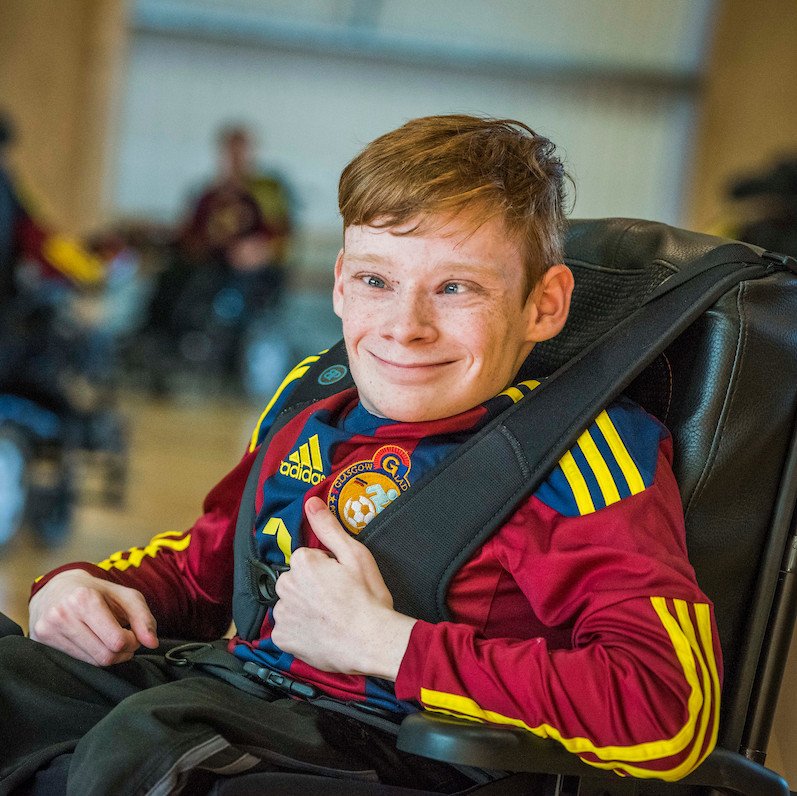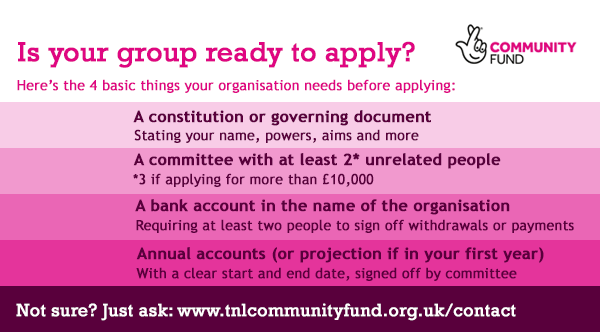I’ve got a great idea for a project. But is my group even eligible for a grant?
Most funders – including The National Lottery Community Fund – will typically only fund organisations to run a project, not individual people. So let’s look at what it takes to be eligible for one of our grants…
What does my organisation need in place?
Whether you are part of an existing organisation, or are just setting something up, there are a few basic things it will need in place before you are ready to start filling in your application to The National Lottery Community Fund. These are:
1. A governing document such as a constitution
This document needs to lay out the name and purpose of your organisation. It should also cover how it will work, like: how people join; how your committee will work; when you’ll have meetings, and so on.
2. A committee or board with at least two unrelated members (or three if you are applying for more than £10,000)
By unrelated we just mean people who aren’t:
- married to each other, in a civil partnership or a long-term relationship
- family members (like siblings, parents and children)
- living at the same address
3. A regulated UK based bank account or building society account in your organisation’s name (as written on the constitution)
You’ll also need to make sure that at least two unrelated people are required to approve the withdrawal or spending of money from the account.
Before you submit your application, you’ll need to attach a copy of a bank statement that is less than three months old.
4. Annual financial accounts
These should clearly state the name of your organisation (again, as on the constitution). They also must show the start and end dates for the 12 month period they cover (e.g. 1 Jan 2018 to 31 Dec 2018).
They don’t need to be produced by a professional, or audited by accountants, but they will need to be signed as accurate by at least two members of your committee.
If your organisation is still in its first 15 months, we will ask for a projection instead, listing what you expect to spend or have as income over the next year.
Do we have to be a registered charity / registered company?
No. There are some people that will only fund registered charities, but you don’t need to be a charity or a company to access most National Lottery Community Fund grants.
The most basic type of organisation for a community group is usually called a ‘voluntary association’. All you need to form a voluntary association is a written constitution – and you don’t have to register this with anyone.
I’m not sure how to set up an organisation. Where can I get help?
Getting your charitable organisation set up is likely to take a bit of work, but there’s loads of help out there.
If you are based in Scotland, a great place to start is to ask your local Third Sector Interface for help. They can often provide free help and advice on getting set up. Your local council might also be happy to help.
If you want a bit more detail on your options, visit the ‘Setting up a charity’ section of the SCVO website. This provides a step-by-step guide on setting up a new group or organisation.
It also includes some useful resources like model governing documents that you can use as a starting point for your own group.
Right, we’ve got all that in place. What next?
If you’d like to talk about which of our grants might be suitable just get in touch with us – we’re happy to have a chat and point you in the right direction.
To find other funders in Scotland, also check out the free Funding Scotland search engine.
Good luck!

National Lottery Awards for All Scotland
A quick way to apply for smaller amounts of funding between £300 and £10,000.
Getting your group ready to apply for funding? Check out this @TNLComFund blog to hear their top tips!
Tweet

[…] our applicants, including CICs, need to have at least three board/committee members. All of these people need to be on the board/committee before you […]
Reblogged this on The Big Lottery Fund Northern Ireland Blog and commented:
Big Lottery Fund Scotland created a great blog that makes setting up a constituted group clear and simple. If you’re thinking of setting up a new group, there are four steps to take:
[…] This blog was originally created and posted by our big blog Scotland team […]
[…] do need to have an organisation with social aims set up before you can apply. There’s just a few basic things your organisation needs in place before it can apply, such as a committee, governing document and bank account. If you aren’t sure […]
[…] Getting your group ready to apply […]
[…] Applicant organisations don’t have to be registered charities. They just have to have charitable or social aims, and meet our basic requirements laid out above. You can read more about these requirements here. […]
[…] Social enterprises take many different forms, and whilst not every social enterprise will be eligible to apply for our funding, many are included like constituted groups, SCIOs, companies limited by guarantee and CICs. However your organisation is set up there are some basic things you’ll need in place before applying, and you can find out all about these on our dedicated blog. […]
[…] You can read more about the requirements for getting your group ready to apply for funding on our blog. […]